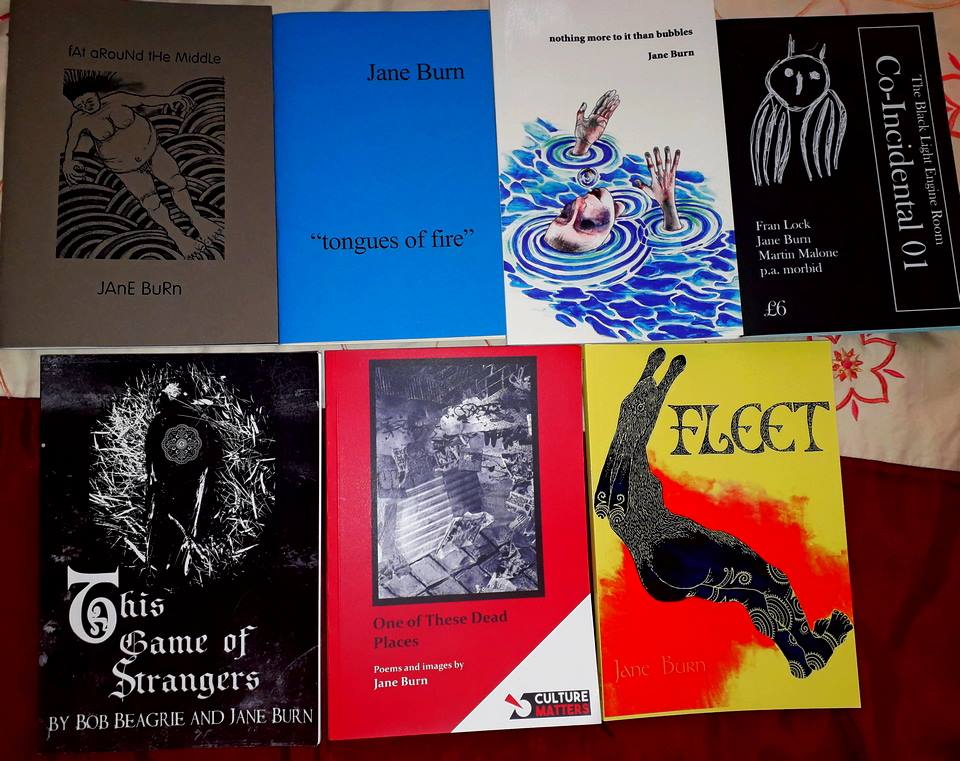
JANE BURN – POETRY AS HARD GRAFT, INSPIRATION, REACTION OR EXPERIMENT?
I interviewed poet & artist Jane Burn who won the Michael Marks Environmental Poet of the Year 2023-24 with A Thousand Miles from the Sea.
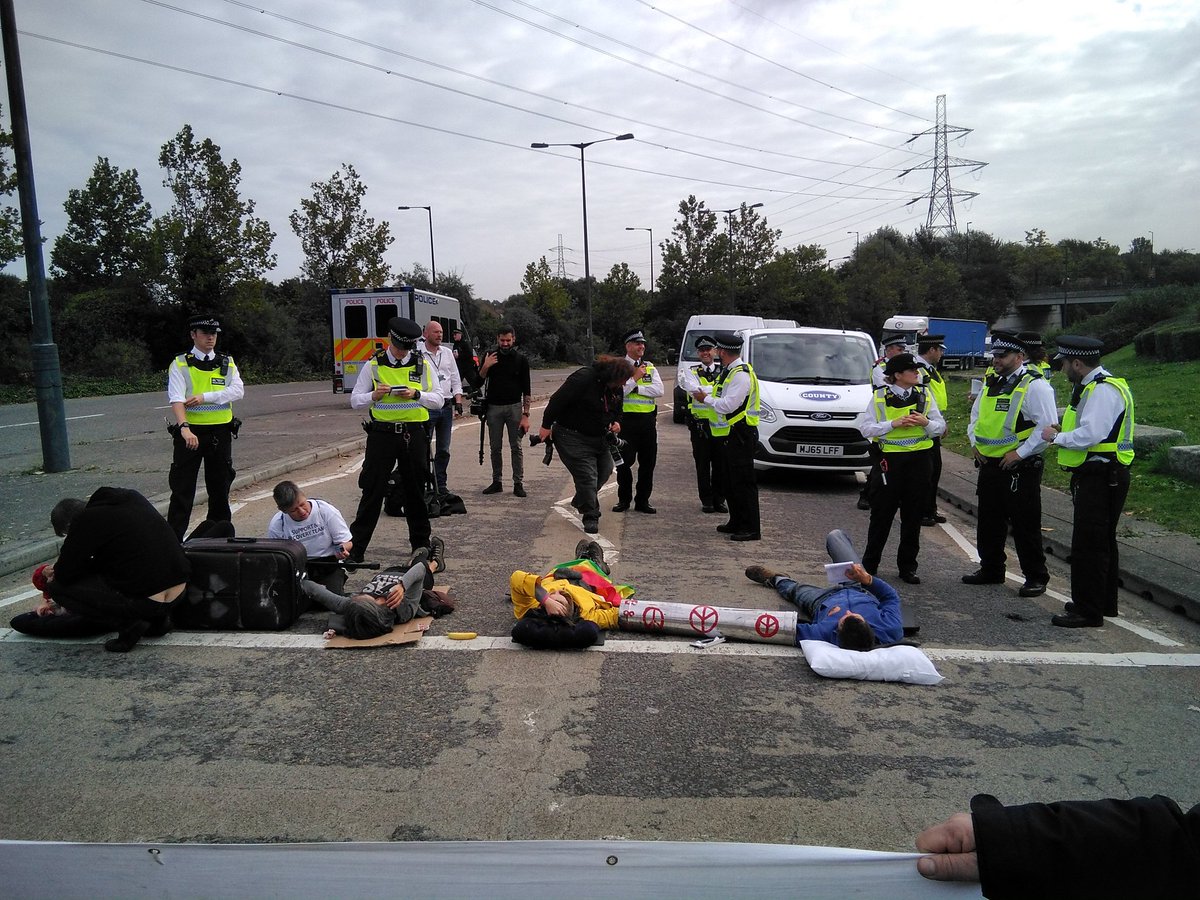
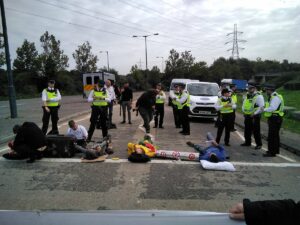 Four young people were lying in the road, ‘locked on’ as partners. One pair had an arm each buried in a connecting steel tube, the other pair were linked by a large grey suitcase. Their ‘locked on’ arms, disappearing into solid blocks, looked like they’d been amputated.
Four young people were lying in the road, ‘locked on’ as partners. One pair had an arm each buried in a connecting steel tube, the other pair were linked by a large grey suitcase. Their ‘locked on’ arms, disappearing into solid blocks, looked like they’d been amputated.
It was eight thirty in the morning outside the ExCel Centre, E. London. The ‘locked on’ couples were blocking the dual carriageway to the London Arms Fair. A queue of lorries and vans delivering weapons and display materials was backed up beyond the approach bridge. It was windy and overcast but the protesters were jubilant and the police had given up threatening to arrest anyone who stood in the road.
The woman on the ground by the central island was twisting side to side. She wasn’t finding it easy. All four protesters had cushions under them, but lying there required the mental strength to be surrounded by a wall of police with the certainty of a cutting-out process and arrest to follow. The locked on couples were as exposed as patients in a dentist’s chair, and only too well aware of their own helplessness.
The woman on the ground had a ‘health and welfare’ colleague crouched by her, offering water, and a legal observer watching the police, while the other protesters were singing and calling slogans. It was stirring, uplifting but edgy. Unlike medicine there was no sedation and when the cutting out team arrived – large men all dressed in black – the serious operation began.
It takes courage to lie flat on your back blocking large lorries. It also requires mind-control to stay calm while notes are taken and you’re warned of arrest. It needs the kind of detached self-abandonment that stunt people practise. It’s an act of imagination, visualising the children who will be killed by these weapons, and putting principle before safety. So it’s about generosity, and driven by conviction. Most of all, it’s unselfish and defiantly meditative. The trick is to give up control, look the other way, or see the dark humour in it.
The cutting out team, like the police, saw it as a job. If they’d stopped for a moment they would have recognised that the protesters were driven by the same impulse as them – the desire to protect victims and stop crime – but they chose the instrumental approach, using their technical skills to get a result. For them, morality didn’t come into it.
For the woman on the ground the cutting out process was a testing experience. Surrounded by black-clad men with power tools, and masked like them to protect from flying particles, she was wincing, partly in anticipation and partly in pain. To break through several layers of impacted material took a long time. Tearing and prising the suitcase apart was difficult and although the men in black handled it with precision, it was jarring and humiliating.
Afterwards, the woman passed from one captivity to another. She was handcuffed, charged and taken to a vehicle. The crowd applauded and cheered her all the way, then the police resumed their activities, threatening arrest, clearing the road and some vehicles passed through.
In the downtime that followed there were performances and speeches, people made craft models, sewed cloth, planted miniature windfarms, chatted or wrapped up against the cold. Despite news of two more lock ons at the other gate, a trickle of traffic passed through largely unopposed. No one wanted to be arrested. Then suddenly, when the heart seemed to have gone out of the protest, a big lorry arrived and a group holding a blue silk banner stepped out. Several other protesters joined them and began to retreat towards the ExCel gate in front of the lorry, chased at a walk-run by the police.
It lasted a few minutes. The lorry went through. But when the police turned around they discovered their mistake. There, lying in the middle of the road, were a couple of young locked on women with a suitcase between them. The decoy action had worked and the road was blocked again.
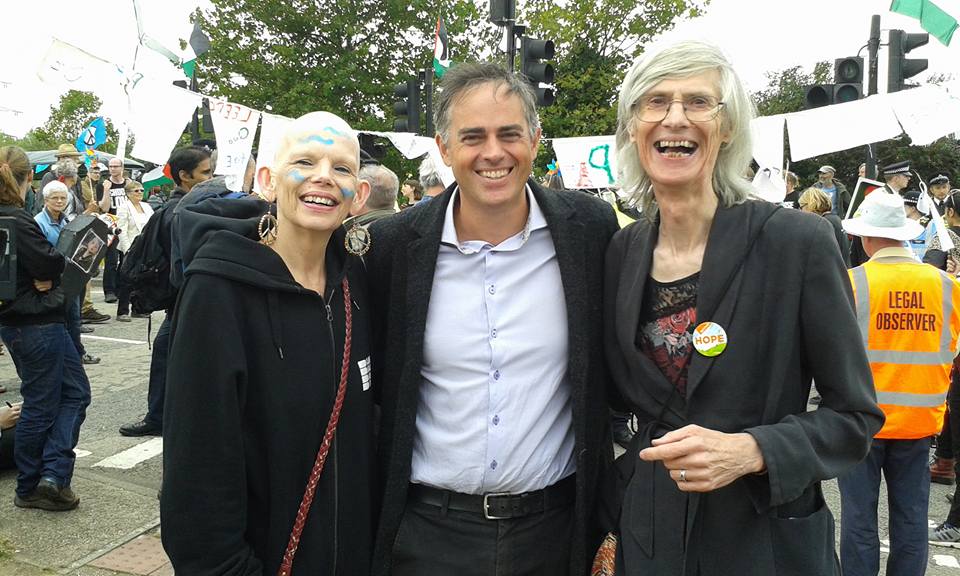
As part of the day’s performances, I read this poem:
In Praise of Wind Turbines
Arms out doing wheelies
they practise at dawn.
Long slow strokes, turning over,
keep the earth moving.
It’s a catch, low down, taken cleanly,
and thrown up to the sun.
An animal grown tall,
grazing all day on air.
Each in position, turning arabesques,
their moves are clean.
Upside down cyclists,
they hold up the sky.
They will go the distance.
Leslie Tate
ABOUT LESLIE TATE’S BOOKS:

I interviewed poet & artist Jane Burn who won the Michael Marks Environmental Poet of the Year 2023-24 with A Thousand Miles from the Sea.
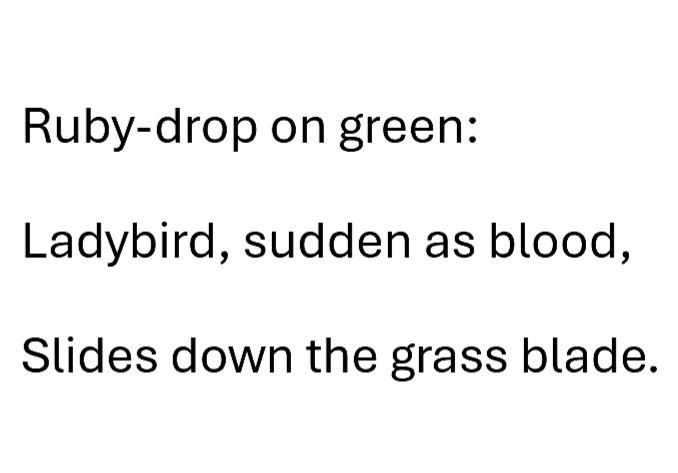
I interviewed ex-broadcaster and poet Polly Oliver about oral and visual poetry, her compositional methods, and learning the Welsh language. Polly says, “I absolutely love
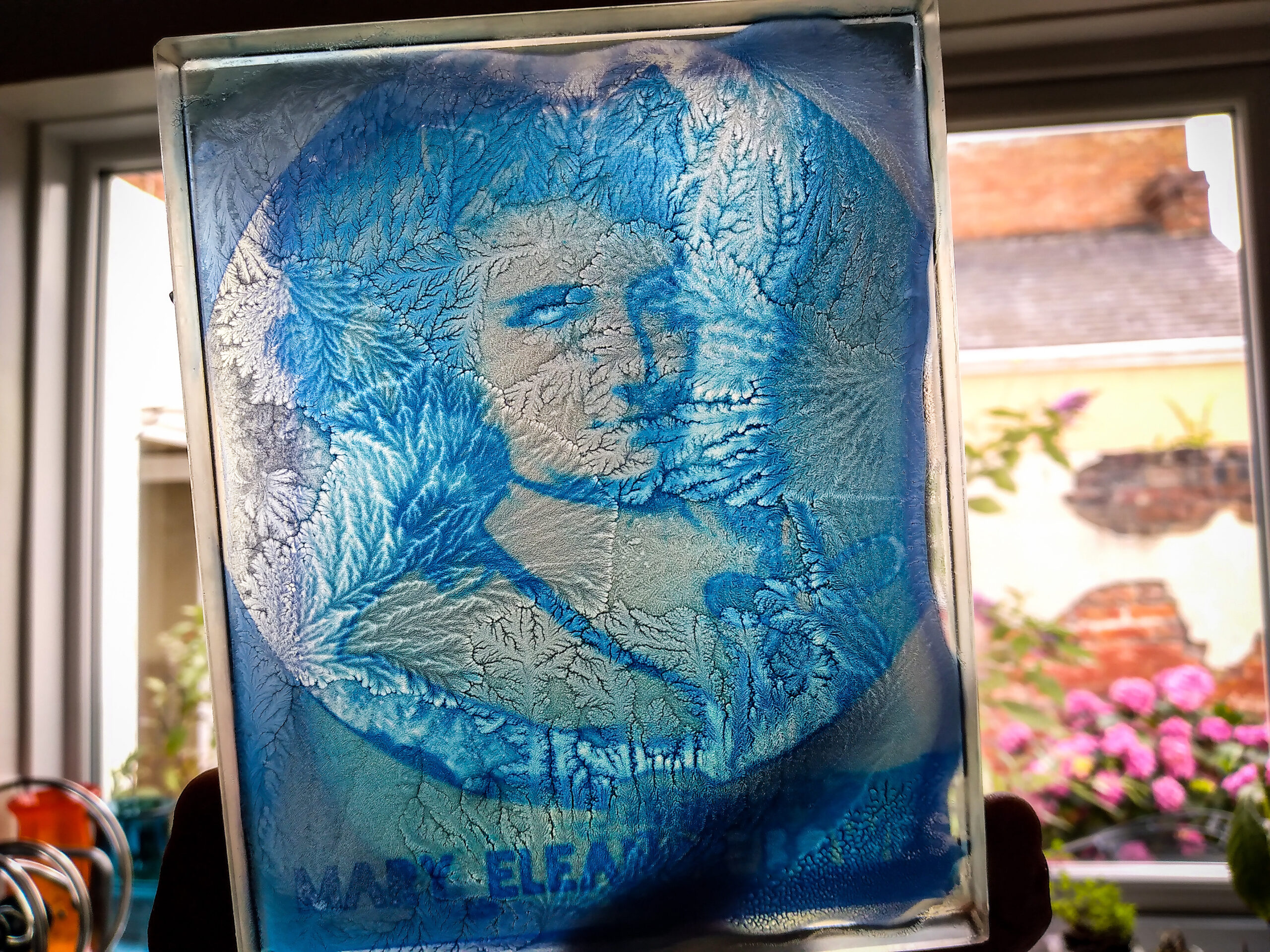
I interviewed Jo Howell who says about herself: “I’ve been a professional photographic artist since I left Uni in 2009. I am a cyanotype specialist.

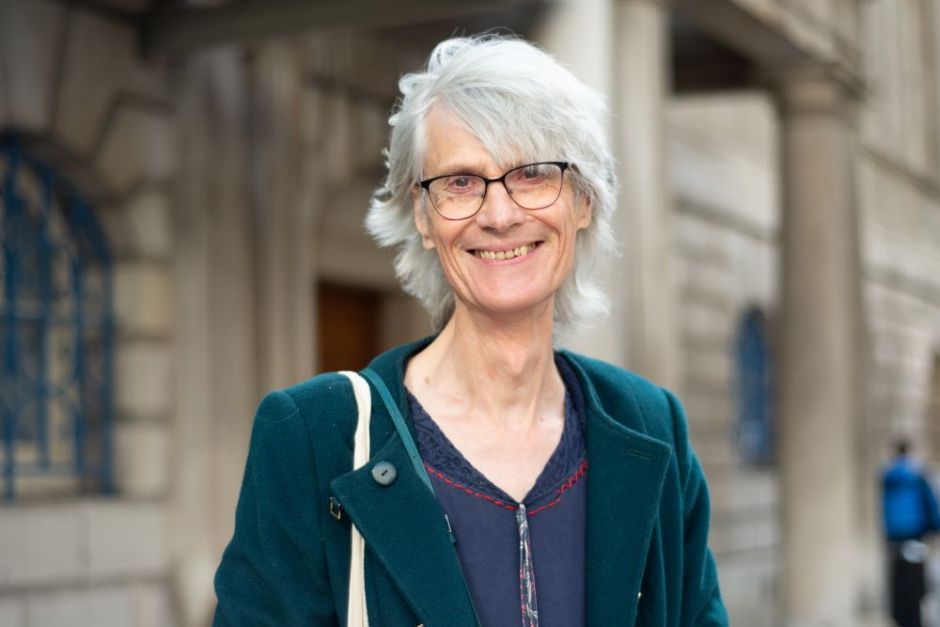
Poet Tracey Rhys, writer of Teaching a Bird to Sing and winner of the Poetry Archive’s video competition reviews Ways To Be Equally Human. Tracey,
| Cookie | Duration | Description |
|---|---|---|
| cookielawinfo-checkbox-analytics | 11 months | This cookie is set by GDPR Cookie Consent plugin. The cookie is used to store the user consent for the cookies in the category "Analytics". |
| cookielawinfo-checkbox-functional | 11 months | The cookie is set by GDPR cookie consent to record the user consent for the cookies in the category "Functional". |
| cookielawinfo-checkbox-necessary | 11 months | This cookie is set by GDPR Cookie Consent plugin. The cookies is used to store the user consent for the cookies in the category "Necessary". |
| cookielawinfo-checkbox-others | 11 months | This cookie is set by GDPR Cookie Consent plugin. The cookie is used to store the user consent for the cookies in the category "Other. |
| cookielawinfo-checkbox-performance | 11 months | This cookie is set by GDPR Cookie Consent plugin. The cookie is used to store the user consent for the cookies in the category "Performance". |
| viewed_cookie_policy | 11 months | The cookie is set by the GDPR Cookie Consent plugin and is used to store whether or not user has consented to the use of cookies. It does not store any personal data. |
5 responses
What a fascinating post, Leslie. That would be a really hard thing to do, lying there in the road like that. Very brave.
Thanks, Robbie. The next day two people chained themselves to the underside of a lorry while other young people climbed on top to ‘surf’ the vehicles. They are heroes.
Brilliant Leslie. Thanks for being there and sharing.
I’m fascinated by the organisation and geography of this event. This protest was well organised, focused and local. Viewed from Montreal, it feels like another world, and almost another time, because it is so personal and peaceful–though hearts must have been pounding. It was also very brave.
Here, so close to the American border, it’s all we can do not to lose our minds and collapse in desperation, with a raving Donald Trump and his retinue of dark lords shaking the continent every minute of every day. The only focus seems to be hanging on while trying to find ways to remove all of them from the levers of power. It is disempowering. It must have felt good to be with people, side by side, making your voices heard.
You’re so right, Michelle. It’s being together and taking action – and chatting, making friendships, enjoying the spectacle. Yes, personal and peaceful.